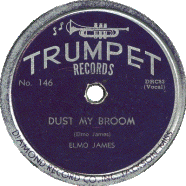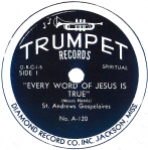These days it’s difficult enough to think about a turntable at all, much less to think about one as a piece of furniture. But in the middle decades of the 20th century, they became mammoths.
These record players (for that’s essentially what they were, hi-fi or stereo) came in all sorts of styles to match your other furniture, too: Mediterranean, French provincial, Queen Ann, you name it. Furniture stores sold these primitive behemoths as well as recordings themselves, and it’s through the furniture business that Lillian Shedd McMurry, a former secretary and law student, fell down a rabbit hole and into the land of the blues.
According to her nephew, recording artist John Webb (“Wilder”) McMurry, “My Uncle Willard, Lillian’s husband, and his family weren’t real musical folks. They all had furniture stores. Willard and a furniture store, my dad, Webb, had a furniture store, and my uncle Carl had Super Furniture Market in Jackson. Willard’s niche was used furniture stores and he would buy the pre-existing stock out of a bankrupt store and get it going again. So there was some stock in a hardware store Willard had bought on Farish Street that included 78s of black music, what would have been called “race music” at the time. Lillian had a lot of get-up-and-go, had played the piano early in her life and was interested in music. But she knew nothing about blues or secular music.”
Lillian selected a record and put it on the turntable The record she chose was Wynnie “Mr. Blues” Harris’s “All She Wants to Do Is Rock”, and according to an interview with Living Blues magazine in 1986, what she heard changed her life. “It was the most unusual, sincere and solid sound I’d ever heard,” she said. “I’d never heard anything with such rhythm and freedom.”
“So Lillian,” Webb continued, “being enterprising, set the rest of the records out on the counter and they sold like hot cakes. And she began to get more involved.” Lillian acquired more records and began selling them on a full-time basis. She made trips to New Orleans and Memphis to bring in more recordings and eventually the couple converted the hardware store into a record/furniture store called Record Mart-Furniture Bargains.
The store specialized in blues, gospel and what was then called “hillbilly” music. Between walk-ins and mail orders the business began to thrive. 
What she was getting into was a pioneering position in the roots music recording industry. The label’s first releases were gospel recordings by the St. Andrews Gospelaires, a 3-piece jubilee group from the Enoch Grove Baptist Church, and the Southern Sons, who were the most popular and influential gospel groups performing during the early 50s in the Mississippi Delta. McMurry made many trips to the Delta to sign up talent, and on one she signed up a “harp” player who called himself Sonny Boy Williamson. Sonny Boy Had garnered a devoted following through his appearances on “King Biscuit Time” over station WFFA in Helena, Arkansas.
McMurry signed Sonny Boy to a contract in December, 1950. She did not learn until years later that his real name was Alex “Rice” Miller. Miller had appropriated the name of another highly-regarded harmonica-playing blues singer because he had once been convicted of stealing a mule from a neighbor. He had whitewashed the mule, which was a sure disguise for the animal until the next inevitable Delta downpour. With McMurry riding herd on him, Sonny Boy Williamson (II) turned out a string of blues standards, including “Eyesight to the Blind”, “Nine Below Zero” and “Red Hot Kisses”, written by Lillian herself. Sonny Boy also wrote a tribute to McMurry’s car, which was recorded as “Pontiac Blues”.
Edward Komara, former head of the Blues Archive at the University of Mississippi, said, “The main thing I remember about Lillian McMurry is her toughness, which was a combination of a low tolerance for bullshit and a lion-taming instinct. This toughness was not something she had to develop while running Trumpet. She may have well had it since birth. She was also born with a pageant-quality beauty, as evidenced by the published photos of her in her 50s, taken during the Trumpet years. But musicians and record industry people alike learned she was much more than a pretty face.”
However she came by it, Lillian McMurry’s toughness became a key asset in the rough-and-tumble world of the independent record business. Sonny Boy Williamson, her biggest star, was hard-drinking, cantankerous and prone to drunken brawling. Williamson also carried a knife and a gun and freely used profane language, but only once around Lillian. Legend has it that when Williamson began cursing in the studio one day, Lillian told him to leave. When he refused, McMurry took his own gun, which she had taken the precaution to relieve him of, marched him outside and sent him on his way. A much-humbled Williamson returned a couple of weeks later, and McMurry took him back in.
According to Webb, McMurry had problems with other artists as well. “She had Elmore James under contract, but Elmore had problems sticking to it. At one point, she got a tip-off and had to go to Canton to bust up a recording session that Elmore had no right to do. There’s actually a tape recording of a telephone conversation between Elmore and Lillian where he’s asking about coming back, and she said, ‘Well, Elmore, would you stand hitched?’ meaning would he honor a contract. But he never followed up on it.”
Elmore James’s only Trumpet recording, “Dust My Broom”, became a nation-wide hit and a classic in the blues repertoire.
But the Trumpet label was short-lived. Even with such brilliant talent stock as Jerry McCain, Arthur “Big Boy” Crudup and Willie Love, competition with labels having deeper pockets eventually proved to be too much. According to blues aficionado Dr. Woody Sistrunk, “One of the biggest reasons Trumpet ended was that a large record distributor in Texas went broke. And back then, it was not cash for sale. A lot of business was on credit, especially as records became hits. If a record became a hit, you had to get it to a pressing plant, and no one had a pressing plant except for the big labels. You had to have it pressed, and if you didn’t get paid by your distributors, or one-stops as it were for stocking juke boxes at the time, you simply didn’t have any money to pay them off,” Sistrunk explained.
“At the very end of Trumpet, Sonny Boy Williamson was the biggest artist that the label had. His contract was traded to Buster Williams’ Plastic Products in Memphis as a trade for some of the label’s debts,” Sistrunk said. “Williams then turned over Sonny Boy’s contract to the Chess Brothers with options, who in turn picked up Sonny Boy and ran with him.”
After only five years (1951-56) in the business, this was Trumpet’s last note. “That was it, except for another $50,000 that Lillian and Willard had to absorb, which they did strictly through hard work,” Sistrunk said. “A lot of people don’t realize how important their studio was. Many of the records were cut at the old State Furniture Company at 211 State Street on the corner of State and Pearl. For a long time, they would cut records in the back room on Sunday afternoons with someone else’s equipment. But by 1954, they had a studio at 309 Farish Street where they were cutting a number of things. That was another big expense during 1953-54, and that set them back some as well.”
Lillian McMurry was a scrupulous businesswoman, a meticulous bookkeeper and obsessive when it came to royalties. “For eight years, I maintained her Trumpet papers at the Blues Archive,” Komara said, “and she never let a single detail slip by. She fought hard and successfully for the artists whose financial estates she assisted. She continued until her death to assist her Trumpet recording artists, scoundrels though they sometimes were. She demanded honesty and got honesty and delivery of contracted promises from them during the recording sessions, and in return she made sure they received what was due.”

“She knew about artists’ egos and she protected them, plus she knew about artists’ sufferings and made sure they all got paid,” Sistrunk said. Vitrice McMurry Rankin, Lillian and Willard’s daughter, said, “Mom was always a strong-willed and fierce person who fought for what was right, treated the musicians with a great deal of dignity and fought for their rights. She was incredibly cagey, and could deal with copyright lawyers on a level of legal think so that she was able to win most of the suits she brought. “
“She was actually close to graduating from Jackson School of Law when she met my Dad and got married, which seems untypical of her that she wouldn’t have gone ahead and finished school,” Rankin said. “She had that kind of steel clamp of a mind that could handle thousands and thousands of legal ramifications and technicalities and argue to the death. I think some of the settlements she got were just to get her off their backs because she was so utterly relentless in her pursuing of these people who did so much bold-faced thievery. She would tend to spend $10,000 to make $10,000. Who knows ultimately if financially it was worth it, but ethically it was, because so many people were vindicated.”
But McMurry’s upstanding business ethics were often sorely lacking in other recording business personalities of the 50s. And the demise of the Trumpet label may have been in part to unscrupulous machinations on the part of other record labels. “Lillian told me that there were some people who wanted to press her out of the business,” Sistrunk said. “And one big label allegedly said, ‘If you stock her labels, we won’t let you stock ours.’ This was a big label, and every jukebox carried this label, and it seemed pretty ugly.”
After McMurry got out of the music business, she still maintained a studio. According to Sistrunk, “’From the Bottom’ and a lot of the later Sonny Boy Williamson songs were recorded there, and she was the one ‘at the knobs’ when Earl King did ‘Those Lonely, Lonely Nights’ for Ace Records. ‘Rockin’ Pneumonia and the Boogie Woofie Flu’ could very well have been recorded there as well.”
The impact of the Trumpet label on American music has been profound and lasting. “You can’t describe Trumpet’s contribution to music history strictly within a blues niche,” Sistrunk said. “You’d have to describe it in terms of the music of Mississippi that was not being recorded, that being gospel with the Southern Sons Gospel Quartet, that being Lucky Joe Almond, Jimmy Swan and all the other hillbilly artists and that being Sonny Boy Williamson and Willie Love with the blues.”
“All of those folded together are basically what made rock-and-roll as we know it. It’s all incredible.”





















